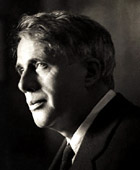| ||
| ||
At the time of his death on January 29, 1963, Frost was considered a kind of unofficial poet laureate of the US. "I would have written of me on my stone: I had a lover's quarrel with the world," Frost once said. In his poems Frost depicted the fields and farms of his surroundings, observing the details of rural life, which hide universal meaning. His independent, elusive, half humorous view of the world produced such remarks as "I never take my side in a quarrel", or "I'm never serious except when I'm fooling." Although Frost's works were generally praised, the lack of seriousness concerning social and political problems of the 1930s annoyed some more socially orientated critics. Later biographers have created a complex and contradictory portrait of the poet. In Lawrance Thompson's humorless, three-volume official biography (1966-1976) Frost was presented as a misanthrope, anti-intellectual, cruel, and angry man, but in Jay Parini's work (1999) he was again viewed with sympathy: ''He was a loner who liked company; a poet of isolation who sought a mass audience; a rebel who sought to fit in. Although a family man to the core, he frequently felt alienated from his wife and children and withdrew into reveries. While preferring to stay at home, he traveled more than any poet of his generation to give lectures and readings, even though he remained terrified of public speaking to the end..."
Sources: http://famouspoetsandpoems.com/poets/robert_frost/biography
http://www.online-literature.com/frost/


No comments:
Post a Comment